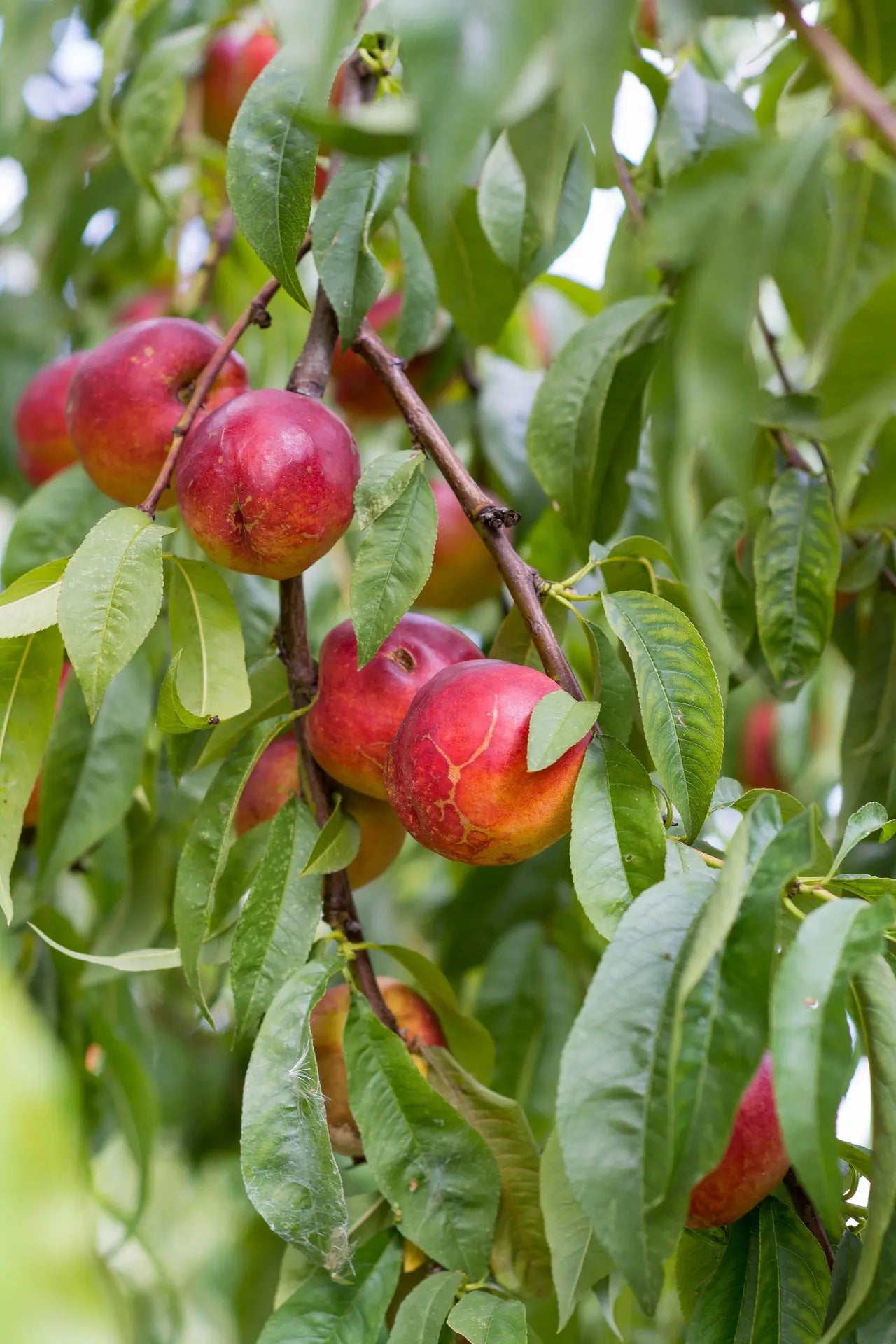-
Delivery from 10 plants to France, Switzerland and Europe
Delivery method -
Fruit Tree Wholesale Supplier
About Us -
Quality Fruit Tree Plants
Technical itinerary
Dooly-cov White Flesh Flat Nectarine Tree grafted on Garnem 1L pot
Dooly-cov White Flesh Flat Nectarine Tree grafted on Garnem 1L pot
The prices shown are our base prices for large volumes. Depending on the quantity ordered and the producers’ pricing scales, the rate may be adjusted upward. Each quote is personalized to ensure you receive a fair price.
Mini order 50 units / Multiple orders 10 units (FRSHER202503001)
Couldn't load pickup availability
 Buy now and get it delivered when you're ready to plant - Add your desired date to your quote request
Buy now and get it delivered when you're ready to plant - Add your desired date to your quote request
- Delivery from 10 plants to France, Switzerland and Europe

```html
Technical sheet of the Dooly-cov flat fruit white flesh nectarine variety
- Fruit flesh color: White
- Skin color: Bright red
- Size and Shape: Medium to large (category A), flat in shape
- Tree Size: Medium to strong vigor with a semi-erect habit
- Fruit maturity: Generally late June/early July
- Fruit Taste: Taste quality generally considered excellent
- Earliness of the variety: Mid-season
- Fruiting period End of June/beginning of July
- Disease resistance and storage: Resistant to cracking (cracking). Very good firmness, which makes handling and transporting the fruit easier.
- Variety Yield: Flat nectarines generally have good production.
- Is this variety self-fertile? Yes
- Commercial use: Suitable for fresh consumption thanks to its unique flat shape, attractive presentation and good taste. Also suitable for direct sales and short supply chains.
- Is this a COV variety? Yes
- Comments: Interesting variety for professional producers thanks to its good visual presentation, high taste quality and favorable agronomic characteristics (very good firmness, resistance to cracking, self-fertile).
```
Quick read / the essentials on Nectarinier Dooly-cov
The Dooly-cov variety is a leading solution for professional fruit growers looking for a flat, white-fleshed nectarine that is early and offers high-quality taste. Developed to meet the expectations of the French market, this variety, protected by a Plant Variety Certificate (PVC), combines a fruit with fine, sweet, and juicy flesh with excellent firmness and appreciable resistance to cracking. Its full, bright red skin, its A size, and its flat shape, typical of so-called "donut" fruits, make it an attractive product for direct sales as well as for specialized channels.
To successfully establish this variety, growers can rely on Arboriverse, a specialist wholesale supplier of nectarine plants , a reliable and experienced partner in the sector. The Dooly-cov harvest takes place between the end of June and the beginning of July, allowing for early commercial positioning, before the summer production peaks. Its good resistance on the tree and after harvest offers valuable logistical flexibility.
Buying Dooly-cov nectarine plants from Arboriverse means benefiting from certified batches, selected according to rigorous criteria. The tree's semi-erect habit and moderate to strong vigor allow good light penetration, promoting quality coloring. Its regular flowering and high yield are guarantees of stability for orchards in production.
As a specialist wholesale supplier of nectarine plants , Arboriverse offers a complete range of compatible rootstocks, such as GF 677 for dry soils, Cadaman for asphyxiating areas, or Montclar for acidic soils. Whatever your region, you can buy Dooly-cov nectarine plants with confidence, with the appropriate technical advice. Choosing Arboriverse, a specialist wholesale supplier of nectarine plants , means choosing performance and reliability to buy Dooly-cov nectarine plants under the best conditions.
Introducing the Dooly-cov white-fleshed flat nectarine variety
Dooly-cov is a flat-fruited nectarine variety with sought-after characteristics for professional production in France. Protected by a Plant Variety Certificate (PVC) , this variety is distinguished by its very good taste quality , attractive presentation , and advantageous harvest precocity . It represents a serious option for arborists wishing to diversify their offer with a flat, white-fleshed nectarine .
Fruit characteristics
The Dooly-cov fruit has a white, fine, sweet, and juicy flesh , meeting market expectations for premium flat nectarines. Although the exact sugar content or sugar-acidity balance is not documented, the eating quality is described as excellent .
The average size of the fruit is classified as category A , corresponding to a medium to large fruit, well suited to commercial requirements. The flat shape is typical of the so-called "donut" or "bagel-like" varieties, offering a distinctive and attractive appearance for the consumer.
The skin is bright red , providing excellent visibility on the shelf and facilitating sorting at harvest. This intense coloration over the entire surface is a sought-after criterion, particularly in direct or niche sales channels.
The fruit also benefits from very good firmness , which allows for appreciable post-harvest stability , reducing the risk of losses during handling. It is also resistant to cracking , a major advantage for a flat nectarine variety, often susceptible to this defect.
Maturity period and precocity
The Dooly-cov fruit ripens between late June and early July , making it an early mid-season variety . This period allows it to reach the market before the peak of competition, offering quality flat nectarines from the beginning of summer.
Good performance on the tree and after harvest facilitates logistical organization for harvesting, storage, and marketing, with a relatively flexible harvest window.
Tree characteristics
The Dooly-cov is a tree of medium to strong vigor , with a semi-erect habit , which makes it easier to grow in an orchard and allows good exposure to light, favorable to the coloring of the fruits.
It is renowned for its very good productivity , with regular flowering. Although precise yield figures are not provided, well-managed adult nectarine trees can reach 20 to 40 kg of fruit per tree , or even more in optimal conditions.
Self-fertility and pollination
Dooly-cov is self-fertile , which simplifies its cultivation by eliminating the need to plant pollinating varieties. However, as with many self-fertile varieties, the presence of other cultivars in the orchard can promote cross-pollination and potentially improve yield .
Resistance to diseases and parasites
This variety has moderate resistance to common nectarine diseases, such as peach leaf curl and powdery mildew . Regular monitoring is still necessary, however, especially during periods of high humidity or in spring.
Regarding pests , Dooly-cov shows moderate tolerance to major pests such as aphids and red spiders . Appropriate preventative treatments and cultural practices that promote biodiversity (nets, sexual confusion, etc.) are recommended, especially in the presence of the Mediterranean fruit fly , which is common in hot areas.
Cultural requirements
Like all nectarines, Dooly-cov prefers well-drained, slightly acidic to neutral soils . It is sensitive to excess lime , which can lead to chlorosis, and vulnerable to root asphyxiation in heavy or compacted soil.
Regular irrigation is recommended during dry periods, particularly during fruit setting and growth, to ensure size and taste quality.
Recommended rootstocks
No specific recommendations are available for Dooly-cov, but the classic rootstocks used in France for nectarines are probably compatible:
- GF 677 : vigorous, suitable for calcareous and dry soils .
- Cadaman : tolerant to root asphyxiation , adapted to heavy soils .
- Montclar : suitable for acidic and well-drained soils.
- Saint Julien A : less vigorous, good for wet or clayey soils .
The choice of rootstock must be adapted to local soil and climate conditions and management objectives (vigor, density, precocity).
Commercial use
Dooly-cov has very favorable characteristics for fresh marketing . Its flat shape , sweet white flesh , and bright color make it particularly suitable for direct sales , short circuits , and specialized markets .
The good firmness and resistance to cracking also allow for medium-distance shipping without loss of quality. Its commercial versatility also opens the way to secondary uses such as artisanal processing (compotes, jams), although this is not its primary positioning.
Legal status and recommendations
As a variety protected by a COV , the cultivation and propagation of Dooly-cov requires respect for the breeder's rights . It is advisable to contact an authorized nurseryman for the acquisition of certified plants, and to inquire about the licensing conditions applicable to its commercial cultivation.
Conclusion
Dooly-cov represents a strategic option for French producers looking for an early , visually attractive , tasty , and easy-to-market flat nectarine. Its self-fertility, good production, and tolerance to post-harvest hazards make it a variety suited to the demands of today's market .
It is recommended to supplement this presentation with direct contact with a specialist nurseryman or the breeder , in order to obtain additional information on cultivation management, average yields observed, and the results of technical trials in the orchard.
To summarize: Nectarine Dooly-cov
The Dooly-cov variety fully meets the expectations of fruit growers seeking to integrate a flat, white-fleshed nectarine that is early, tasty, and commercially attractive. Its "donut" shape, its A size, its sweet and juicy flesh, as well as its intense red skin position it as a high-value product for short supply chains, direct sales, or specialized networks. Its resistance to cracking and its good firmness are additional advantages for the preservation and transport of the fruit.
To ensure a successful orchard, it is advisable to turn to Arboriverse, a specialist wholesale supplier of nectarine plants , which supports producers in the choice of rootstock, planting organization and technical advice. The self-fertile Dooly-cov is easy to integrate into an orchard without cross-pollination constraints, while benefiting from good production potential, estimated at 20-40 kg per adult tree in optimal conditions.
Buying Dooly-cov nectarine plants from Arboriverse also means benefiting from recognized expertise, rigorous traceability and tailor-made support. The most common rootstocks (GF 677, Cadaman, Saint Julien A) are available and selected according to management objectives and local soils. Thanks to its technical approach, Arboriverse, a specialist wholesale supplier of nectarine plants , is a trusted ally for any modern orchard project.
In short, whether you are looking to renew your varieties or create an orchard specializing in flat nectarines, you can buy Dooly-cov nectarine plants from Arboriverse, a specialist wholesale supplier of nectarine plants , in complete safety. With its early mid-season positioning and its excellent commercial profile, buying Dooly-cov nectarine plants is a wise choice to anticipate summer demand and diversify your fruit offering.
-
Dooly-cov White Flesh Flat Nectarine Tree grafted on Garnem bare-root 100-120 cm
Regular price €5,95 EURRegular priceUnit price / per -
Dooly-cov White Flesh Flat Nectarine Tree grafted on RP-40 bare-root 100-120 cm
Regular price €6,55 EURRegular priceUnit price / per -
Dooly-cov White Flesh Flat Nectarine Tree grafted on PR-R/Mirared bare-root 100-120 cm
Regular price €6,15 EURRegular priceUnit price / per -
Dooly-cov White Flesh Flat Nectarine Tree grafted on GF677 and Mirab.29-C bare-root 100-120 cm
Regular price €5,75 EURRegular priceUnit price / per -
Dooly-cov White Flesh Flat Nectarine Tree grafted on Garnem 1L pot
Regular price €6,25 EURRegular priceUnit price / per -
Dooly-cov White Flesh Flat Nectarine Tree grafted on RP-40 1L pot
Regular price €6,85 EURRegular priceUnit price / per



